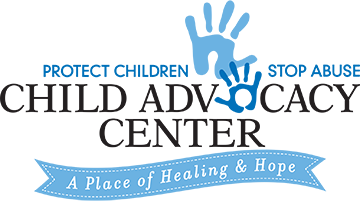
A child you care about has reported being the victim of a crime, what will happen? What should you expect? First, be very, very proud of your brave child for coming forward. Many children do not come forward. Their disclosure, telling someone in authority who has reported the abuse, will often result in several agencies becoming involved. All of the agencies want to do the best job they can with the information they receive and none of them want to put children through unnecessary trauma.
The first agencies you may see is the Department of Social Services and one of our law enforcement agencies. Both are trying to collect initial information to know the next steps to take. Generally, a forensic interview will be scheduled at the Child Advocacy Center. They have trained interviewers that know how to conduct child forensic interviews and it is a neutral location; importantly, NOT the location where the offense(s) occurred and not being conducted by someone with any type of pre-existing interest in the information collected. The child will then, frequently, be sent for a specialized medical exam with someone who has experience in forensic child medical examinations. They have specialized knowledge in collecting information and evidence and testing. This exam is very important, even if your child has a primary pediatrician, the CME is conducted by someone with more specialized skills to know what to look for and test for and how to test for certain things other pediatricians may not normally see. Law enforcement will continue to do additional investigation and may interview other witnesses and talk to the suspect(s) as well as collecting any type of physical evidence, including digital and other types of evidence. Law enforcement will then, if they believe they have sufficient evidence to rise to the level of probable cause, seek a warrant or other form of process to pursue charges against a suspect.
If the suspect is a juvenile, this process will be handled through the juvenile justice system. Juvenile cases are handled in juvenile court. Misdemeanor cases are handled in District Court. Generally, felony cases begin in district court, but move to Superior Court once the Grand Jury returns an indictment.
Once a case has been indicted, it is assigned to an assistant district attorney in Superior Court in the District Attorney’s Office. Many of these cases will be assigned to a handful of assistant district attorneys with years of experience in handling cases where children are victims. Within the District Attorney’s Office, we work together to review and evaluate cases. Victim Witness Assistants who have also worked in cases with child victims and their families will also be in touch with you about filling out victim impact information. You can also contact our office with questions.
It is important to know, that despite what you may have seen portrayed in movies, books, and television programs; children, like all witnesses in criminal proceedings, generally must testify in person on the stand during criminal trials. The Constitution’s Confrontation Clause makes this necessary and caselaw from the past few decades has reinforced this necessity. While that may seem scary and unfair, please know we will work to help make your child comfortable and prepared if the case goes to trial.
Most cases in the criminal justice system result in plea agreements. Do not think that a plea is a bad outcome. Strengths and weaknesses of individual cases are weighed in making plea negotiation decisions. A child, and other witnesses, do not have to testify during a plea, but do have the opportunity to provide victim impact statements about how the offense has impacted the child and the family.
Many offenses involving children, but not all, require registration if the defendant is convicted. Generally, offenders who are required to register because of an offense involving a child also have other restrictions about where they can live, work, and other statutory restrictions.
It can be scary and daunting to think about the criminal trial process and the criminal justice system, but our office wants to help victims and their families feel comfortable and confident as cases move through the system.
